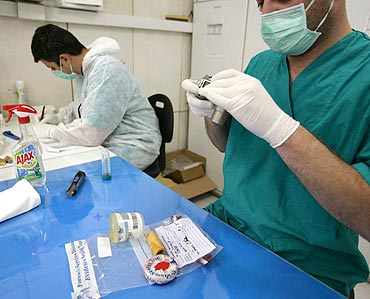
Who was the world's first forensic scientist? History says it was Archimedes. A new crown had been made for King Hiero II. Had the goldsmith added some silver or was it solid gold? Who could solve this mystery without dissolving the crown?
It was Archimedes who solved it. He had noticed that water rising whenever he stepped into a bathtub. He solved the problem based on the volume of the crown, and the amount of displaced water.
But it was actually Sir Arthur Conan Doyle's creation of Sherlock Holmes in the late nineteenth century that popularised the usage of science in solving crimes. It is the scene of the crime that often leads to the culprit. Enter the forensic scientist; it's his job to collect evidences at the crime scene.
Though the field has existed for years yet, it is still not a career option for many, despite TV serials like CSI (Crime Scene Investigation) and a plethora of detective novels having become popular.
Have you ever thought of exploring the field as a career? Riddhi N. Parekh, who participated in 'Awareness week' at her college during graduation, got inspired to enter Forensics for her post-graduate studies.
"It is a challenging field. There being no empirical evidence of criminal scenes while studying is the only sad part," she says. Riddhi is a second-year student in the MSc programme for Forensic Science. So she once showed up at a robbery scene committed near her house, and helped collect first-hand forensic evidence.
Relevance in real life
Forensic science applies scientific knowledge to aid the administration of justice, and has no boundaries as far as subjects are concerned. The discipline uses resources from sciences like physics, chemistry, biology as well as medicine. "There is hardly anything that can't be resolved through forensics, starting from a petty theft to social paternity disputes," says Dr MS Dahiya, Director at the Institute of Forensic Science, GFSU.

There are three basic categories to forensic science.
The first is forensic medicine. This includes forensic pathology, psychiatry, psychology, forensic medicine, and odontology (dentistry).
The next is laboratory science. Laboratory science involves chemistry, biology, toxicology, ballistics, fingerprints, questioned documents and impressions.
Finally, you have field sciences, which include crime scene investigation, including fire and explosion scenes, and drug laboratories.
There's nothing casual about this field, and one must be very attentive during studies and during the investigations. Here's why. "At a crime scene you have only one chance to collect evidence and lead the investigation. Even a single mistake on your part may be responsible for justice being denied," warns Dr. Kewel Krishan, Senior Assistant professor, Department of Anthropology, Panjab University, Chandigarh.
The main areas and functions include some of the following.
Forensic pathology. The main areas include the conduct of post-mortem analyses, to find out the cause, time and manner of a death.
Crime laboratory analysis. This involves work in the laboratory, in areas like microanalysis and DNA testing.
Forensic engineer. The forensic engineer deals with cases of traffic accidents, fire investigations, and wrongful injury cases.
Forensic architects. This involves design mortuaries and forensic science institutes.
Forensic vetenary surgeons. Here, the expert conducts autopsies on animals and helps to investigate mysterious animal deaths.
Wildlife forensic specialists. This involves the detection of illegal traffic or trade that is being done through the misuse of animals, like elephant tusks, lions, and tiger skins.
Forensic psychiatrist. Here, there is a need to integrate clinical experience, knowledge of medicine, mental health, and the neurosciences.
Forensic toxicoologist. The specialist carries out and examines adverse effects of chemicals on living organisms.
Forensic odontologist. Here, knowledge is used of teeth or oral structures to explain death associated with crimes like sexual assault.
Forensic serologist looks at the physical evidence submitted in criminal cases such as homicides, sexual assaults, burglaries, and robberies.

What to study
Institutes in India offer courses in forensic science at the undergraduate, postgraduate, diploma and certificate levels. You can do some short-term courses as well (view table for list of programmes). Clearing the All India entrance exams is mandatory to get entry into a course. The eligibility for a BSc Forensic Science is 10+2 in science.
You need a strong science background, and being good in mathematics is an unsaid prerequisite. You need a BSc in any discipline to pursue a two-year MSc in Forensic Science. Punjabi University, Patiala offers a two-year MSc (Forensic Science) with a specialisation in forensic biology, forensic serology, forensic chemistry and forensic toxicology. Dr Hari Singh Gour University in Sagar has an MSc in Forensic Science as well as a PhD.
You can apply for a post-graduate diploma course in forensic science or criminology as a graduate. Usually, one-year programmes also accept non-science students. The Faculty of Science, Department of Anthropology at the University of Delhi offers a one-year PG Certificate course in Forensic Science.
An MPhil or PhD in Forensic Science is also a path several take, instead of finding a job. "I want to become a Forensic Wildlife scientist. So, a PhD is the next stop," says Rushabh Shah, an MSc Forensic Science student of GFSU. Those who have secured 60 per cent in post-graduation can pursue research. The Bureau of Police Research and Development offers a fellowship.
Scope in India
Though forensic toxicology, forensic biology and crime scene investigation have always had scope, India is actively moving forward in this field, and keeping up with the technological changes across the world. The Gujarat Forensic Science University was set up exclusively to offer super-specialised post graduate degree courses in order to address this very need.
Forensic Speech Science deals with recording and analysing voice samples using a spectrogram, which is a machine to help identify the speaker. Voice recordings are permissible as evidence in the court of law for anti-corruption and other criminal offences. The All India Institute of Speech and Hearing (AIISH), Mysore offers courses in Forensic Speech Sciences Forensic accounting is another option, which involves the detection and prevention of financial fraud. Students get exposure to the field by writing research papers as part of their course.

Aptitude and skills
"Technical skill can be developed through the curriculum. But the intelligence and aptitude that one needs in order to solve a crime cannot be taught," believes Dahiya. Good academic skills with knowledge in different science fields is therefore a must to excel in this career.
The field also demands an eye for detail, strong analytical skills, and keen observation powers. The ability to work with experts from other fields like psychology, social science and statistics is a must. And one must be comfortable working indoors as well as outdoors.
Job opportunities
These largely depend on one's area of specialisation. Graduates can work in government and private agencies, hospitals and laboratories. Some corporates hire graduates as document experts. Other areas include anti-terrorist operations, mass disaster management, cyber crime investigation, protection of human rights, environment, consumer and intellectual property rights.
Students find entry into other vocations such as civil services, banks, police, pharmaceutical industry, the paint industry, clinical research, biotechnology and software, too. A student starting out as a lab assistant or technician can expect to get Rs. 20,000 to Rs 25,000 per month initially.
Academics is another avenue where one can teach at a college or university, and earn a minimum of Rs. 25,000 to Rs. 30,000 per month. Forensic Science Laboratories (FSL) across India hire forensic scientists. FSL Bangalore recently recruited 60 scientific assistants, half of them women, who started with a basic salary as low as Rs. 7,000 per month. However, we advice you not to merely look at these figures, but consider all career growth possibilities. Also, salaries vary drastically across sectors.
For instance, the Central Bureau of Investigation (CBI), the Intelligence Bureau (IB) and the Police departments offer higher pay. CBI's forensic laboratory in Delhi recruits candidates through the Union Public Service Commission exams. Private agencies are another place to start. If you choose to freelance, you need a certification by the state forensics department to practice.
And finally, Dahiya summaries, "Widen your vision. Instead of concentrating on the bull's eye, get a bird's eye view." Be open to the world of mystery, science, and conquering the unknown.

The leading institutions for Forensic Science study include some of the following.
Amity University, Noida: BSc, MSc, PHD
Bundelkhand University, Jhansi: BSc, MSc
University of Delhi, New Delhi: Certificate
Dr Harisingh Gour University, Sagar: MSc, PhD
Gujarat Forensic Sciences University, Gandhinagar: MSc
Gujarat University, Ahmedabad: MSc
Institute of Forensic Science, Mumbai: BSc, PG Diploma
National Institute of criminology (NICFS), New Delhi: MSc
Osmania University, Hyderabad: MSc
Punjab University, Chandigarh: MSc
Pt. Ravishankar Shukla University, Raipur: MSc, PhD, PG Diploma
Punjabi University, Patiala: MSc, PG Diploma
Sam Higginbottom Institute, Allahabad: BSc, MSc, PhD, Diploma
University of Lucknow, Lucknow: PG Diploma
St. Xavier's Collge, Mumbai: Basic/Advanced certificate
Jitendra Chauhan College of Law, Mumbai: Diploma
Fellowships on offer
Areas: A range of fields in criminology
Duration: 3 years
Eligibility: MSc; must have passed the UGC-conducted CSIR exam, and should be registered or in the process of registering for a PhD course.
Website: www.bprd.nic.in